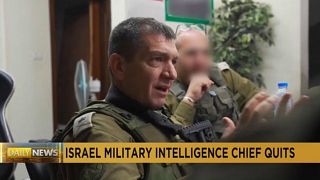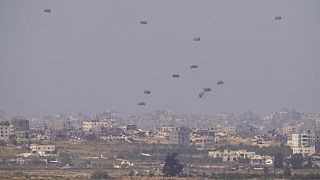Gaza City
This Saturday (Apr. 20), as has been the case almost everyday for the past 6 months in Gaza, funeral prayers were held.
The Israeli military operation in the enclave has flattened mosques, churches, schools, hospitals as well as archaeological sites.
The latest airstrike in southern Gaza city of Rafah which occured on Friday night killed at least 9 Palestinians, including 6 children leaving surviving relatives in despair.
"I don't want to say anything to the world or to anyone because this is an unjust world," the bereaved father says, holding his deceased daughetr in his arms. "This is a world deprived of all human values and morals. It only understands the language of power."
"They bombed a house full of displaced people, women and children, in this manner."
Rafah currently hosts more than half of Gaza’s total population of about 2.3 million people, the vast majority of whom have been displaced by fighting elsewhere.
Those who are not killed by strikes face hunger especially in northern Gaza where a UN-backed report has warned of imminent famine.
On footage dated April 18, a bakery in Gaza City is seen operating for the first time since October with aid from the World Food Programme
The bread provides just a porting of the desperately needed food.
The siege imposed by Israel on one of the world's most densely populated areas has contributed to decimating food production, distribution and agriculture.
In the occupied West Bank, another front of the war, the Israeli military continues to raid Nur Shams refugee camp.
According to Palestinian news agency Wafa, a 15-year old Palestinian is reportedly among the victims.
The Israeli army claims it killed 10 fighters.
The Islamic Jihad militant group said three of its members died.
No official death toll has been provided just yet.
The human toll of 6 months of war is heavy: over 33,800 people have been killed.
Hundreds of humanitarian workers as well as journalists and their families are among those killed by Israeli strikes.
Settler violence
Human Rights Watch says Israeli forces either took part in or failed to stop settler attacks on Palestinians in the occupied West Bank that displaced hundreds of people from several Bedouin communities last fall.
The Human Rights Watch report released Wednesday (Apr. 17) focused on the earlier rash of violence.
Following October 7, the Israeli military called up 5,500 settlers who are Israeli army reservists, including some with criminal records of violence against Palestinians, and assigned them to West Bank “regional defense” battalions, the report reads.
Israeli authorities handed over 7,000 guns to battalion members and others, including so-called civilian security squads established in settlements, according to Israeli newspaper Haaretz, and local rights groups.
Media reported that settlers left leaflets and sent threats on social media to Palestinians after October 7, such as warnings to “flee to Jordan” or be “exterminate[d],” and that “the day of revenge is coming.”
The UN has recorded more than 700 settler attacks between October 7 and April 3, with soldiers in uniform present in nearly half of the attacks. Attacks since October 7 have displaced over 1,200 people, including 600 children, from rural herding communities. At least 17 Palestinians were killed and 400 wounded, while Palestinians have killed 7 settlers in the West Bank since October 7, the UN reported.












Go to video
Egypt FM Abdelatty: Egypt is making "continuous, genuine and non-stop efforts” for ceasefire in Gaza
Go to video
Heavy equipment needed to clear rubble destroyed in Israeli strike on Jabaliya
01:49
For Palestinians in Gaza, the ongoing ceasefire negotiations signify little hope
01:05
Israeli tourists barred from Maldives as act of support for Palestinians
01:29
Palestinians lined up for hours for food by a charity kitchen in central Gaza.
Go to video
Gaza: Egypt's foreign minister rejects displacement of Palestinians